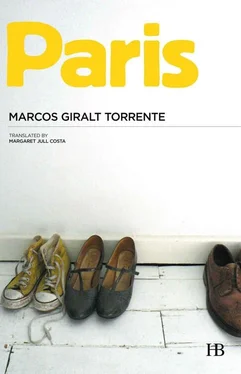Marcos Giralt Torrente - Paris
Здесь есть возможность читать онлайн «Marcos Giralt Torrente - Paris» весь текст электронной книги совершенно бесплатно (целиком полную версию без сокращений). В некоторых случаях можно слушать аудио, скачать через торрент в формате fb2 и присутствует краткое содержание. Год выпуска: 2014, ISBN: 2014, Издательство: Hispabooks, Жанр: Современная проза, на английском языке. Описание произведения, (предисловие) а так же отзывы посетителей доступны на портале библиотеки ЛибКат.
- Название:Paris
- Автор:
- Издательство:Hispabooks
- Жанр:
- Год:2014
- ISBN:9788494228452
- Рейтинг книги:5 / 5. Голосов: 1
-
Избранное:Добавить в избранное
- Отзывы:
-
Ваша оценка:
- 100
- 1
- 2
- 3
- 4
- 5
Paris: краткое содержание, описание и аннотация
Предлагаем к чтению аннотацию, описание, краткое содержание или предисловие (зависит от того, что написал сам автор книги «Paris»). Если вы не нашли необходимую информацию о книге — напишите в комментариях, мы постараемся отыскать её.
Paris — читать онлайн бесплатно полную книгу (весь текст) целиком
Ниже представлен текст книги, разбитый по страницам. Система сохранения места последней прочитанной страницы, позволяет с удобством читать онлайн бесплатно книгу «Paris», без необходимости каждый раз заново искать на чём Вы остановились. Поставьте закладку, и сможете в любой момент перейти на страницу, на которой закончили чтение.
Интервал:
Закладка:
And that was that. As I went in, I didn’t see her put the phone down. The door concealed this action from me, and when I’d closed it, nothing about her appearance or her attitude revealed anything untoward. And she made no mention of it, either. She assumed that I’d heard nothing and seemed not to care if I had, and I, for my part, merely sat down on her bed, saying that I couldn’t sleep. She drew back the covers on the other side by way of invitation, and I seconded that gesture by slipping in between the sheets. For a while, as she began the usual ritual and embarked on a dialogue intended to make me forget my inability to sleep, all I could think of were the words I’d heard just a few moments before. I was troubled by the tone in which they’d been spoken, and I’m sure that I asked myself, however briefly, what it was that had provoked that tone of voice. It’s equally true, though, that not for a second did it occur to me that I might be the subject of their conversation. As with everything important that happens in childhood, that realization only surfaced later, on the evanescent screen of memory. That night, as my mother talked to me and I lay at her side, listening simultaneously to what she was saying and to the capricious flow of my own thoughts, my replies became less and less focused, more spaced out, and I finally succumbed, defeated, to her melodious, absorbing voice. I fell asleep, and when I woke in the morning and found her dressed and standing by the bed, my only doubt, the only one that really interested me, was whether she had spent the night with me or if, as on other occasions, she had waited until I fell asleep to go and occupy my empty bed.
VII
The two years that my father spent in prison are like a bellows that seems to empty and fill in accordance with the contours of memory. Some folds are plump with evocative sensations, circumstances, or moments, and in others the void of the unspoken and unrecorded renders the fertile soil of memory barren. Given that I was so keenly aware of incidents like the one described above, it may seem strange that I was completely deceived about my father and had unquestioningly accepted his disappearance without seeking any answers other than the rather lame ones provided by my mother. It may seem strange, and yet it’s very easy to explain. Those two years, which would not necessarily be a time of substantial change for an adult, could easily, at the age I was then, have meant the transition from unconsciousness to a more critical mindset, from nonanalytic, unreflecting acceptance to an awakening of the ability to make my own judgments. I don’t mean that none of these things occurred on the night when I heard my mother talking to my aunt on the phone. I’m convinced I found out nothing new that night, nothing I didn’t know already, and that what I heard through the door did not make me rethink the fixed elements, the certainties and uncertainties that sustained my life at the time. For a few moments, the moments during which I stood listening at my mother’s bedroom door, I could have become a witness to the vulnerability my mother usually concealed from me, but I had neither eyes nor time to seize that opportunity. I had heard my mother complain, weep, and beg for help, and it wasn’t that I couldn’t have given her that help or couldn’t imagine the reason for her distress, simply that I wasn’t even in a position to guess how deep that distress went. I was troubled by her tone of voice, which was entirely new to me, and I could have been on the brink of uncovering a facet of her personality quite different from those already known to me, but the fact that such a discovery aroused no doubts in me and neither fuelled a desire to know more nor filled me with a fever to seek out further dark, suspicious depths is proof that the incident did not shake the ground beneath my feet and make my whole world totter, did not become a defining, before-and-after moment. On the other hand, I did store it away in my memory, and in doing so, I cancelled out any harmful effects it might have had; this was a major change from what would have happened one or two years before, when something similar could easily have occurred but without leaving any trace or so much as a shadow on my memory.
Something quite different happens in the case of the other vast, unpopulated hours, all that lost time I am completely unable to encapsulate in images or recover by means of words. People say that childhood images return with old age and that they exist in a kind of fog until then, a tunnel growing ever deeper, with smooth, uniform walls from which only a few light bulbs hang, not bright enough to illuminate their whole length. Perhaps that’s where the feeling of emptiness comes from, an emptiness that has to wait until old age for the shadows to be filled with light, for faces and conversations, fears and the hours spent together, games and arguments and the inevitable moments of tension to present themselves to me just as they were, each one distinct from the others. My mother waking me up each morning; my mother telling me to hurry up so as not to miss the school bus; my mother leaving the house to drive to work; my mother at home, where she had been since midday, when I returned at six; my mother insisting that I do my homework; my mother worried; my mother happy; my mother as sole spectator of my childish witticisms; my mother reading me books I couldn’t read on my own; my mother answering my questions; my mother sending me to bed and then coming to kiss me goodnight; my mother closing the door; my mother letting me caress her or her caressing me. . The journey to and from school; the weekends that would grow in my mind’s eye before they arrived, until their glow was doused by the dull gray of Sundays; days that were both different and the same; short days and long days; days when, on returning home, she alone was there to greet me. There are many such instants worth recalling and that cancel each other out, superimposing themselves one upon the other with all the force of the unalterable. And yet, somehow, even though they’re not particularly significant and contain no revelation that makes them stand out from the rest, even though they don’t pester me or clamor for my attention, there are certain memories that always surface: the Christmas morning when we went out to buy something and had to walk all the way home again because my mother had forgotten her purse; coming back in the car from somewhere or other and, while we were stopped at traffic lights, hearing through the lowered window two drivers engaged in a heated altercation; the afternoon my mother reached out her hand to pick up a cup of coffee and I saw in her large-boned wrist the antecedent or model of my own wrist, which, while not yet as thick as hers, was already preparing to outstrip hers and to grow as it grows now in my memory of that moment; or the steep, dirt track in the park beside our house that I will always associate with the clothes my mother was wearing one midday when we walked down it to go and have lunch at a nearby restaurant — short skirt, polo neck sweater in the same blue as the skirt, knit tights, also blue, and matching low-heeled shoes with rounded toes.
I suppose that, basically, what I need is a candle to light my memory. Living with my mother, seeing her every morning and every night, talking to her more than to any other person throughout the day, it was difficult to find a dissonant note, some ever-widening crack that might put at risk the stability of the edifice she had created in order to give me shelter. When I look back at those distant days, I’m surprised by the tranquility, the lack of color, and the monotony with which they passed. My mother, as I said, was very disciplined, which meant that life with her followed strict rules, not only regarding superficial matters — the organization of time and the tasks we undertook together — but also what could not be observed directly, the inner life that, with most people, is subject to the changeable tides of mood, but that in her case, rarely got in the way of what she deemed appropriate for each moment and its fulfillment. That’s why she exuded such confidence, why there were no upsets or unforeseen incidents and why, in her company, few things seemed unattainable. Life with her was like a straight line. There were no particularly serious problems, no enigmas that could not be resolved with a look, a few words of consolation, or a discreet silence.
Читать дальшеИнтервал:
Закладка:
Похожие книги на «Paris»
Представляем Вашему вниманию похожие книги на «Paris» списком для выбора. Мы отобрали схожую по названию и смыслу литературу в надежде предоставить читателям больше вариантов отыскать новые, интересные, ещё непрочитанные произведения.
Обсуждение, отзывы о книге «Paris» и просто собственные мнения читателей. Оставьте ваши комментарии, напишите, что Вы думаете о произведении, его смысле или главных героях. Укажите что конкретно понравилось, а что нет, и почему Вы так считаете.












